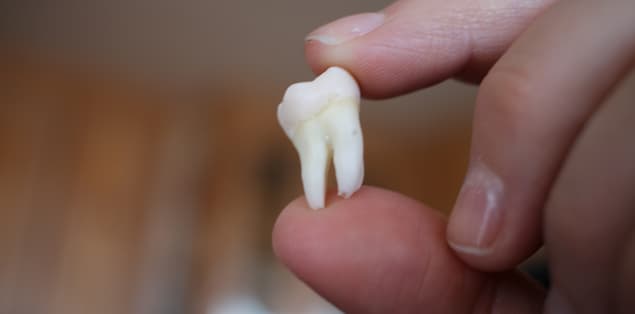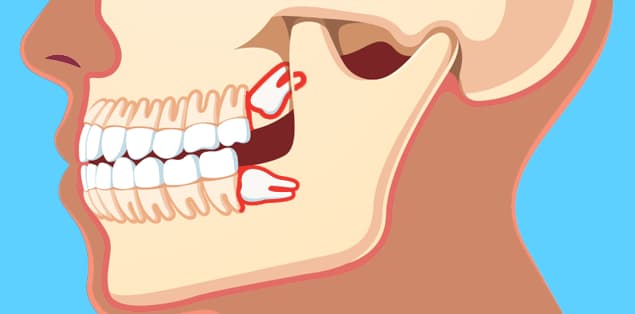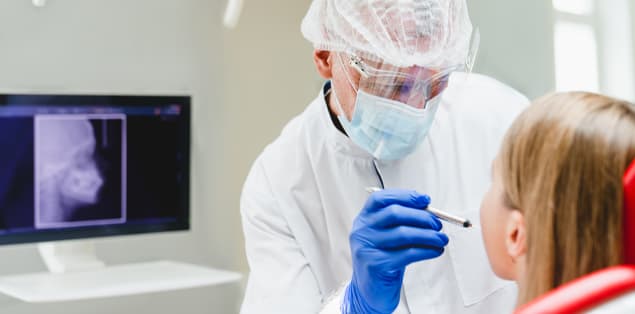Are you wondering about the purpose of the wisdom teeth? Ever raised your thoughts about how often people develop wisdom teeth? If you are resonating with what we are saying, you are at the right place. Dig out what the American Association has to say on it. You will find that these three sets of molars were taken into consideration during our ancestors’ time.
This dental milestone gives more chewing power to eat raw meat and other tough foods in the heydays. The gender of the person has nothing to do with the wisdom teeth. However, age is the topic because wisdom teeth fully emerge during the large transformation back in the mouth.
Many other studies believe that wisdom teeth may be the ancestor’s evolutionary answer to chewing and eating hard food.
Let’s dive deeper into the detailed explanation of what causes wisdom teeth to grow. By the time this article ends, you will learn a lot about Why Do We Have Wisdom Teeth? What’s the total count of wisdom teeth you have? How to track your wisdom teeth growth? Does it become a problem? And what standard of dental care is required? Continue reading!
What Are Wisdom Teeth?
First comes first. In their late teens or early twenties, wisdom teeth are the third and final molars that most people get. People call them wisdom teeth because they usually come in (erupt) when you’re a little older and “wiser.”
In a nutshell, young adults during early adulthood have such flatter kinds of teeth. These third sets of molars are the last permanent teeth that develop between 17 to 21, irrespective of gender.
While some people never have any problems with their wisdom teeth. But on the flip side, there are cases when wisdom teeth are the reason behind oral health problems. In that case, one must immediately rush to seek dental care. In addition, wisdom teeth are not visible often in most cases.
Dentists can confirm the visibility only after X-rays. In addition, impacted wisdom teeth are the ones that cause the most problems. This is when the teeth get stuck in the gum and don’t come in all the way or when they come in at an angle. Impacted wisdom teeth can crowd other teeth and cause damage to them.
Why Are They Called Wisdom Teeth?
This third set of molars back in your mouth comes through at a more mature age. And hence, they are associated with the age when people are presumably wiser than teenagers. These third molars are commonly called wisdom teeth because they appear so much later than the other teeth – usually between 17 and 25. This is considered an age of wisdom and maturity, hence their name.
They are used to chew or tear hard food into smaller pieces. Our ancestors didn’t have modern knives, forks, or spoons to crush food in the heydays. This third set of molars is considered for tough foods and raw meat.
Molars are the large teeth at the back of the mouth used for grinding food. We have four molars, two on top and two at the bottom. The first and second molars usually come through around 6-7 years old. The third molars – or wisdom teeth – appear much later.
While some people never develop wisdom teeth, others have them removed due to problems such as being impacted (trapped under the gum line) or growing in at an angle. Having wisdom teeth extracted is a common dental procedure.
How Many Wisdom Teeth Do You Have?
Although, most people have four wisdom teeth (1 in each corner of the mouth). But some people who have smaller jaws have been found with fewer than four. In addition to your surprise, many people with broader jaws have extra wisdom teeth called ‘supernumerary’ teeth.
Suppose you believe the American Association of Oral and Maxillofacial research. In that case, there are cases when people have double wisdom teeth – eight wisdom teeth.
Does Everyone Have Wisdom Teeth?
No, not everyone has wisdom teeth. Some people have fewer than four wisdom teeth or none at all. It’s also possible to have more than four wisdom teeth. Whether or not you have wisdom teeth is determined by your genes.
In addition, roughly 20-25% of the human population has less than four wisdom teeth. To your surprise, 35% are born without wisdom teeth. However, the wisdom teeth emerge during late teen days or early adulthood.
How Do You Know Your Wisdom Teeth Are Growing?
Also, you can find out and see your wisdom teeth are coming in. Once you can feel the symptoms of these third molars easily. For instance, if you have irritation in your gums or pain around the jaws, this is a clear sign that your wisdom teeth are growing.
Furthermore, if you are feeling increased sensitivity to cold or hot temperatures in the mouth, consider that wisdom teeth are beginning to emerge through the gums.
There are reports that people face pain when biting down even softer foods. If that is what you are facing, the chances are high that your wisdom teeth might be growing in at some other surface, and hence, pain is troubling you!
While if you talk about the most common signs of the wisdom teeth coming in, it includes light visibility of the teeth. In more simple words, you can see that your wisdom teeth grow through the surface of your gums.
If you are experiencing any of these symptoms, it’s good to see your dentist or oral surgeon and have them check things out. Only dental experts, after x-rays, can determine what to eat if you have to go through wisdom teeth removal.
What Do Wisdom Teeth Look Like?

They’re usually larger than the other teeth in your mouth. They’re usually positioned at the very back of the jaw. They can also be tilted or crooked, making them difficult to clean properly. If you don’t take care of your wisdom teeth, they can lead to several problems, including cavities, gum disease, and even tooth loss.
That’s why it’s important to see a dentist regularly and have your teeth checked for any problems. So don’t consider their important-sounding name. All you need to know is if you are feeling pain, get your wisdom teeth roots checked by expert dental care.
Why Do Wisdom Teeth Become a Problem?
Wisdom teeth become a problem when they cannot erupt through the gum line or when they grow at an angle. This can cause them to become trapped or impacted in the jawbone. They may only partially erupt when this happens, making them difficult to clean and care for.
Additionally, impacted wisdom teeth can cause pain, swelling, and infection. In some cases, they may also damage adjacent teeth. However, if wisdom teeth are not causing any problems, they do not need to be removed.
Can a Wisdom Teeth Take the Place of a Molar?
It’s a common question and one that doesn’t have a straightforward answer. It depends on the individual case, as each mouth is unique. In some instances, wisdom teeth can take the place of molars, while in others, they may not be able to provide adequate coverage.
Ultimately, it’s best to consult with a dentist or orthodontist to find out what will work best in your particular case.
What Is an Impacted Wisdom Tooth?

An impacted wisdom tooth is a tooth that has not erupted through the gum line or has only partially erupted. This can happen when there isn’t enough space in your mouth for the tooth, if the tooth is angled incorrectly, or if another tooth blocks the tooth.
Impacted wisdom teeth can cause problems because they’re hard to clean and can lead to infection, pain, and damage to other teeth. Wisdom teeth removal is a standard procedure that can help prevent these problems.
If you have an impacted wisdom tooth, your dentist or oral surgeon will assess the severity of the impaction and determine whether removal is necessary. It may be possible to treat the impaction without removing the tooth in some cases. However, in most cases, wisdom tooth removal is the best option.
Can Proper Dental Care Help Prevent Problems With Wisdom Teeth?

Yes, you can reduce the risk of infection by adapting careful dental hygiene. For example, if you brush and floss your teeth regularly, you can keep your wisdom teeth healthy. Additionally, you should also see your dentist for regular checkups to detect any problems with your wisdom teeth early and treat them.
If you suffer from wisdom teeth pain, always try to eat soft food because it’s easier to chew softer foods than harder ones. Last but not least, you can follow some basic home remedies after consultation with your dental expert to alleviate the pain of impacted wisdom teeth.
Do You Have to Get Your Wisdom Teeth Removed?
It depends, and the decision to get your wisdom teeth removed hovers on the severity of the pain. For some people, wisdom teeth cause no problems, and they remain healthy and functional throughout their lifetime.
On the other hand, people who don’t have a broader jaw face the problem where the wisdom tooth emerges from another angle and becomes imparted. This results in pain, crowding, and other dental problems. The best solution is to have the wisdom teeth removed.
Suppose your wisdom teeth are causing problems, or you expect them to cause problems in the future. In that case, your dentist or oral surgeon may recommend that you get them removed. Furthermore, removing the third set of molars is considered a common practice in the dental industry.
Dental experts do wisdom tooth removal typically under local anesthesia, sedation, or general anesthesia.
After removing your wisdom teeth, it is important to take care of your mouth and follow your dentist or oral surgeon’s instructions. This will help ensure a speedy and complication-free recovery.
Is Wisdom Teeth Removal Procedure Expensive?
There is no single answer to this question since the cost of wisdom teeth removal can vary depending on several factors. For instance, how many teeth you need to get removed, the complexity of the procedure and the geographical location play a significant role in the final cost.
However, in general, wisdom teeth removal tends to be relatively expensive. For example, according to one estimate, the average cost of wisdom teeth removal in the United States is between $600 – and $1100. Therefore, if you consider having your wisdom teeth removed, it is important to factor in the potential cost of the procedure.
How Many Wisdom Teeth Can You Get Removed at Once?
If you’re considering having your wisdom teeth removed, you may be wondering how many you can get taken out at once. The answer depends on a few factors, including the position of your teeth, the severity of any crowding or impaction, and your overall oral health. However, most people can have up to four wisdom teeth eliminated in a single sitting.
Suppose your wisdom teeth are impacted or especially difficult to remove. In that case, your dentist or oral surgeon may recommend limiting the number of extractions to two or three. This can help ensure a smoother, more comfortable recovery process.
What Happens If You Don’t Get Your Wisdom Teeth Removed?
If you don’t have your wisdom teeth uprooted, there’s a chance they will become impacted or stuck beneath the gum line. Impacted wisdom teeth can cause pain, swelling, and infections. They can also damage nearby teeth.
Our early ancestors or early humans had stronger teeth than the current generation because they didn’t eat junk food and ate clean.
Is Wisdom Teeth Removal Painful?
Wisdom teeth removal can be a harrowing experience for some people. Others may only experience minor discomfort during the procedure. The level of pain you experience will depend on several factors, including the type of procedure you undergo, your pain tolerance, and the severity of your condition.
Some people are more sensitive to pain than others. If you have low pain tolerance, you may want to consider taking pain medication before and after the procedure.
Some people report feeling extreme pain immediately after wisdom teeth removal. This is often because the area around the wisdom teeth is very sensitive. The pain may subside after a few days, but it can take up to a week for some people to feel completely normal again.
Other people only experience minor discomfort during wisdom teeth removal. This is usually because the procedure is not as invasive as it could be. In some cases, your oral expert may only need to make a small incision to remove the wisdom teeth. This means that there will be less pain and swelling after the procedure.
Does Getting Wisdom Teeth Extracted Affect the Jaw?
When it comes to wisdom teeth, there are a lot of myths and misconceptions out there. For example, one common question that patients often ask is whether or not removing wisdom teeth will affect the jaw.
The answer to this question is no; removing wisdom teeth will not affect the jaw. However, it is beneficial to remove wisdom teeth because they can often lead to problems like overcrowding, infection, and pain. So, if you’re wondering whether or not you should get your wisdom teeth uprooted, the answer is a resounding yes!
Can Wisdom Teeth Grow Back After Extraction?
It’s also a common question: Can wisdom teeth grow back after extraction? Unfortunately, the answer is no; they cannot. Once you get your wisdom teeth removed, they are gone for good.
However, new teeth can come in behind your wisdom teeth, so it is best to get them checked by an oral surgeon to be sure. Your chewing power will increase after the removal of your wisdom teeth.
Can Wisdom Teeth Cause Headache?
Wisdom teeth can cause headaches for several reasons. One reason is that they can put pressure on the nerves in your head, leading to pain. Additionally, wisdom teeth can become infected, leading to pain and inflammation.
Suppose you are experiencing headaches and think that your wisdom teeth tend to be the cause. In that case, it is important to see an oral surgeon so that they can determine whether or not your wisdom teeth are the source of your pain.
Treatment for wisdom tooth-related headaches will vary depending on the individual situation but may include removing the wisdom teeth, prescription medication, or other measures.
Can Wisdom Teeth Cause Nausea and Dizziness?
It’s common to experience discomfort after having wisdom teeth uprooted. This can include pain, swelling, and bruising. In some cases, people may also experience nausea and dizziness after the procedure.
These symptoms are usually mild and go away within a few days. However, if they persist or become severe, it’s essential to see a doctor. Nausea and dizziness can sometimes be signs of a more serious condition, such as internal bleeding. Contact your doctor right away if you experience these symptoms after having your wisdom teeth uprooted.
Is It Normal to Feel Some Discomfort After Wisdom Teeth Removal?
While it’s normal to feel some discomfort after wisdom permanent teeth removal, there are things you can do to help ease the pain. Taking over-the-counter pain medication, such as ibuprofen or acetaminophen, can help.
You can also apply a cold compress to the outside of your face to reduce swelling. Contact your doctor if you’re still feeling nauseous or dizzy after a few days. They may recommend additional treatment options, such as a prescription medication.
If you’re scheduled to have your wisdom teeth emerge, it’s important to be prepared for some discomfort afterward. In most cases, the pain and swelling will go away within a few days. However, contact your doctor right away if you experience nausea or dizziness. With proper care and treatment, you should be feeling back to normal.
How to Get Rid of Wisdom Teeth Pain?
There are a few things you can do to help ease the pain of wisdom teeth:
- Rinse your mouth with warm saltwater. This will help to reduce swelling and inflammation.
- Take over-the-counter pain medication such as ibuprofen or acetaminophen.
- Apply a cold compress to the outside of your cheek to help numb the area.
- Try not to eat hard or chewy foods that can irritate your gums. Instead, stick to soft foods like mashed potatoes and soup.
If the pain is severe, you may need to see oral and maxillofacial surgeons to have your wisdom teeth uprooted. Wisdom teeth extractions are a common procedure and are usually very successful in relieving pain and discomfort.
Final Words – Why Do We Have Wisdom Teeth?
Wisdom teeth function dates back to our ancestors’ times when they used to consume tough foods and heavy meat. During the same time, their jawline, too, was big. But now, with the evolution of humankind, humans have adapted ways to soften foods with cool gadgets like knives, crushers, etc.
But now, fast forward to today, our jawline has become less broad. Last but not least, if you need to visit the dentist, don’t be anxious before surgery.
